STATEHOUSE REPORT | ISSUE 21.47 | NOV. 25, 2022
BIG STORY: S.C. filled with lots of potholes, new study says
NEWS BRIEFS: Biden declares disaster for 3 coastal counties for Ian storm damage
LOWCOUNTRY, Ariail: Leftover turkey
COMMENTARY, Brack: Taylor’s delightful new book is culinary treasure
SPOTLIGHT: SCClips
FEEDBACK: Send us your thoughts
MYSTERY PHOTO: Another statue
S.C. filled with lots of potholes, new study says
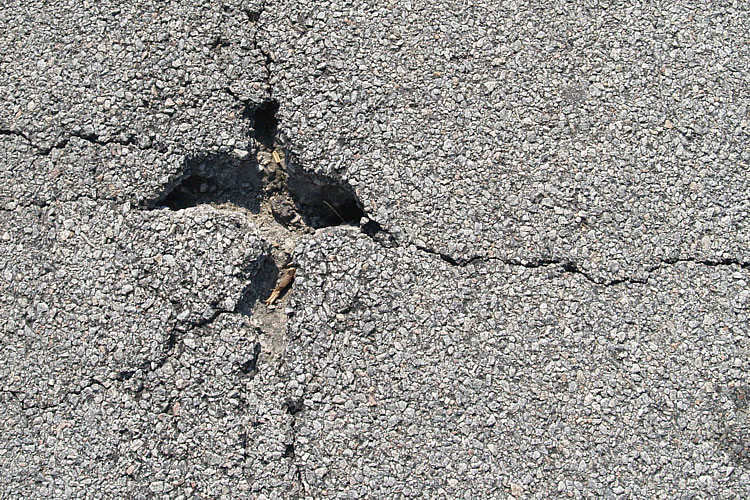
Staff reports | A new study reveals what South Carolina drivers have long known – Palmetto State potholes are among the worst in the country.
The new study by QuoteWizard found that South Carolina ranks as having the 14th worst pothole issues in the United States. The company, an insurer, obtained this data by tracking and analyzing the search data of pothole-related complaints and repairs for each respective state for the last year.
The state’s high ranking is perhaps not too shocking to many, especially considering a 2022 report from a national group that analyzes surface transportation found South Carolina drivers paid a collective total of $1.7 billion a year as a result of deteriorating roads — which includes pesky pothole damages.
Yes, our roads suck
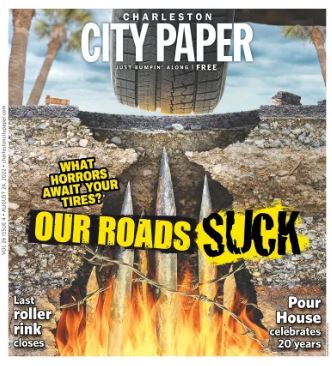 Earlier this year, the Charleston City Paper used a free, crowdsourced app called Carbin — which was developed by researchers at the Massachusetts Institute of Technology (MIT) — to measure the quality of Charleston’s roads and streets. To say the least, the findings were not good. Charleston City Paper was, for example, unable to locate a good quality road in Charleston.
Earlier this year, the Charleston City Paper used a free, crowdsourced app called Carbin — which was developed by researchers at the Massachusetts Institute of Technology (MIT) — to measure the quality of Charleston’s roads and streets. To say the least, the findings were not good. Charleston City Paper was, for example, unable to locate a good quality road in Charleston.
Out of the 40+ routes in the Charleston area measured by the newspaper , no roads in downtown Charleston were classified as good quality. The worst roadways measured by City Paper in Charleston were Chalmers Street, Line Street, Hagood Avenue, Ashley Avenue and Calhoun Street.
How to protect your vehicle from potholes
There are a multitude of ways in which potholes can do serious harm to vehicles, which includes popping tires, inflicting damage to wheel rims, ravaging engine or exhaust systems and throwing off a vehicle’s alignment, as well as ruining the shocks and struts of the vehicle, according to QuoteWizard.
So what can South Carolina drivers do to protect themselves from potentially destructive pothole damages and costly repairs?
QuoteWizard recommends drivers look into getting collision insurance, because while most people may associate collision insurance as strictly providing coverage for vehicles that collide with other vehicles, it also generally covers vehicles that are damaged from hitting potholes as well.
Additionally, QuoteWizard suggests drivers should properly inflate their tires and ensure that tread grooves on each one are deep enough. If avoiding a pothole is not possible, drivers are encouraged to slow down, avoid hitting the brake pedal and straighten the steering wheel before the impact occurs.
- Have a comment? Send to: feedback@statehousereport.com.
Biden declares disaster for 3 coastal counties
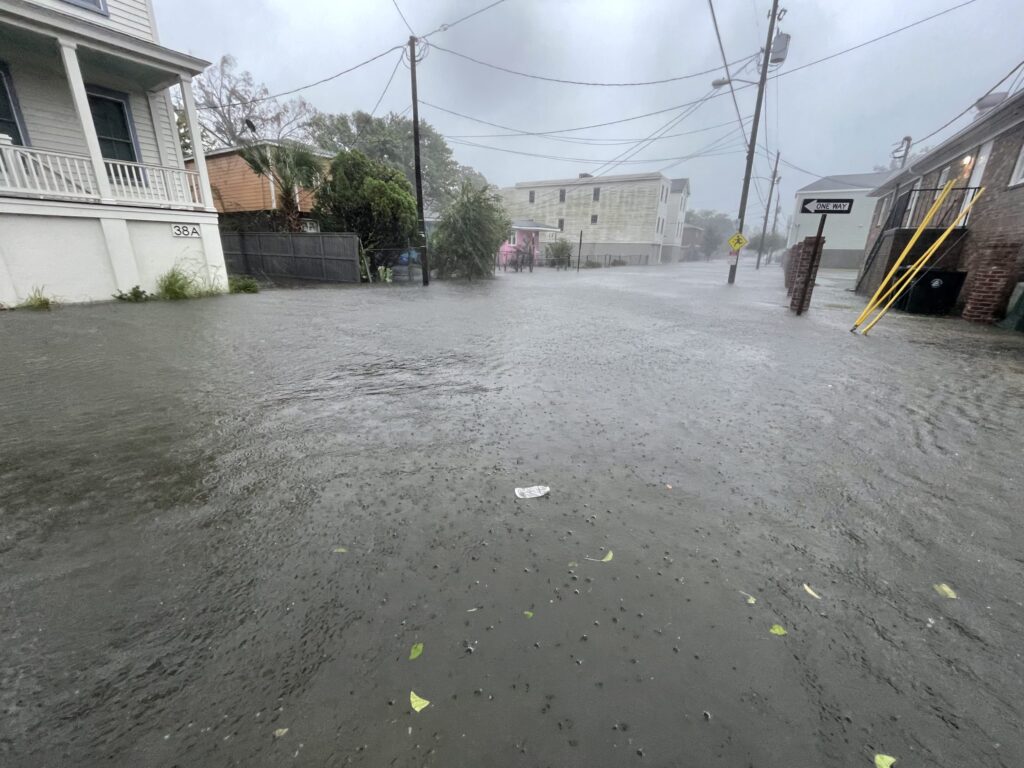
Staff reports | President Joe Biden this week declared a major disaster exists in Charleston, Georgetown and Horry counties following Hurricane Ian in late September. The declaration opens federal aid to supplement state and local recovery efforts.
According to the White House, “Assistance can include grants for temporary housing and home repairs, low-cost loans to cover uninsured property losses, and other programs to help individuals and business owners recover from the effects of the disaster.
“Federal funding is also available to state and eligible local governments and certain private nonprofit organizations on a cost-sharing basis for emergency work and the repair or replacement of facilities damaged by Hurricane Ian in Berkeley, Charleston, Clarendon, Georgetown, Horry, Jasper and Williamsburg counties.”
In other news this week:
![]() S.C. House members to push gender-altering ban. Conservative members of the state House announced they are pre-filing legislation to ban gender-altering medical procedures for minors.
S.C. House members to push gender-altering ban. Conservative members of the state House announced they are pre-filing legislation to ban gender-altering medical procedures for minors.
Upstate lawmaker expected to lead House budget-writing committee. S.C. Rep. Bruce Bannister, R-Greenville, is expected to be named head of the powerful House committee that writes the state budget.
Graham testifies in Georgia probe investigation. U.S. Sen. Lindsey Graham, R-S.C., testified in a Georgia court Tuesday morning as part of an investigation into former President Donald Trump’s efforts to overturn the 2020 election.
SC-4: Upstate congressman’s wife files for divorce. Sarah Timmons, wife of GOP U.S. Rep. William Timmons, has filed for divorce after a marriage of almost three years. The case was sealed by a judge.
Unemployment rate rises in S.C. South Carolina’s unemployment rate rose to 3.3% in October, according to data from the state Department of Unemployment and Workforce.
State parks offer free admission today. As an incentive to get people into nature, state parks today offer free admission.
Laffitte guilty on six federal counts. In a case that has captivated the nation, a federal jury in Charleston deliberated almost 11 hours Tuesday before finding former Hampton banker Russell Laffitte to be guilty on six federal fraud counts for aiding former lawyer Alex Murdaugh in a financial scheme that plundered client accounts of millions of dollars. Laffitte is expected to appeal the verdict that followed a three-week trial. Laffitte’s conviction makes him the first person connected to Murdaugh to be convicted of a crime. Murdaugh is also accused of murdering his wife and son. Meanwhile, Murdaugh’s this week questioned blood spatter evidence on a shirt connected to Murdaugh.
Experts concerned about pandemic over holiday travels. Health experts across the country are worried that mass holiday travel and big family gatherings may accelerate the current “tripledemic” of RSV, flu and Covid-19. Meanwhile, South Carolina officials reported 2,790 new Covid cases and 16 deaths in the last week.
Leftover turkey

Cartoonist Robert Ariail often interprets things a little differently, but always has an interesting take on what’s going on in South Carolina. Love the cartoon? Hate it? What do you think: feedback@statehousereport.com.
Taylor’s delightful new book is culinary treasure
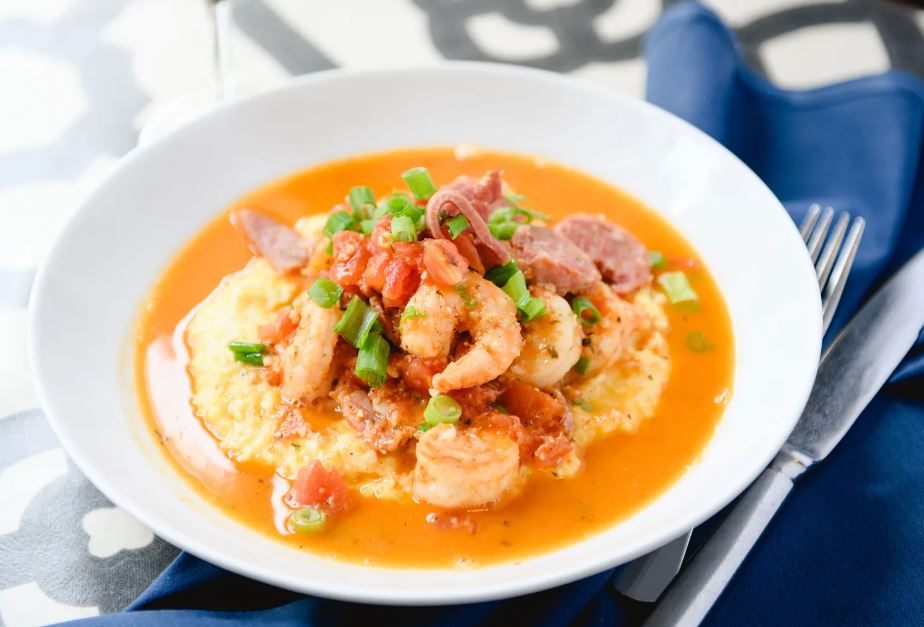
By Andy Brack | Sometimes, it’s not all about Republicans and Democrats. Sometimes, at least in the South, it’s just about food. Witness all of the recent thankfulness and carb-laden gluttony in homes across the Palmetto State, where tasty food is aplenty.
 Now comes a culinary treasure for which we must sing hearty praises – food historian John Martin Taylor’s new book of essays, Charleston to Phnom Penh: A Cook’s Journal. This collection of musings, some previously published, is a 240-age celebration of a life rooted in the South Carolina Lowcountry and influenced by food and wine from the Caribbean, France, Italy, eastern Europe and Cambodia, where Taylor now lives.
Now comes a culinary treasure for which we must sing hearty praises – food historian John Martin Taylor’s new book of essays, Charleston to Phnom Penh: A Cook’s Journal. This collection of musings, some previously published, is a 240-age celebration of a life rooted in the South Carolina Lowcountry and influenced by food and wine from the Caribbean, France, Italy, eastern Europe and Cambodia, where Taylor now lives.
Taylor tells stories of 1960s food-focused trips as a boy from Orangeburg with his intellectual parents to then exotic American locations like New York and California. They might stay in modest hotels, he wrote, but they didn’t skimp on the food. When the family moved to Orangeburg from Louisiana when Taylor was young, his parents worried about where they’d get good wine – not the standard fare of Southerners of that day.
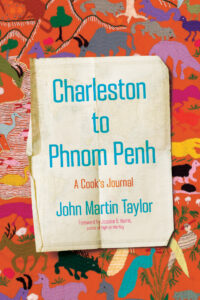 By the mid-1970s, Taylor was in graduate school at the University of Georgia where he happened to be friends with the nascent B-52s (they’re still friends today). “My apartment was occasionally the scene of wild dance parties. We would take turns manning the turntable because all our recordings were on vinyl.” He and his buddies would dance to everything from Motown to New Wave to old-time rock ‘n roll. Even today, he dances. “The kitchen is my dance hall. I have arthritis and a fake knee, but it is simply impossible for me NOT to dance to Junior Walker’s “Shotgun.” (Go give it a listen now and see if you can resist.)
By the mid-1970s, Taylor was in graduate school at the University of Georgia where he happened to be friends with the nascent B-52s (they’re still friends today). “My apartment was occasionally the scene of wild dance parties. We would take turns manning the turntable because all our recordings were on vinyl.” He and his buddies would dance to everything from Motown to New Wave to old-time rock ‘n roll. Even today, he dances. “The kitchen is my dance hall. I have arthritis and a fake knee, but it is simply impossible for me NOT to dance to Junior Walker’s “Shotgun.” (Go give it a listen now and see if you can resist.)
We met Taylor more than two decades ago on a languid porch at a historic Lowcountry plantation party where we immediately bonded over shrimp, drinks and lots of laughter. At the time, he was researching and writing about Southern foodways before Charleston was a foodie town. He also had a cookbook store, Hoppin’ John’s, at the corner of Anson and Pinckney streets in Charleston where you could sniff the pungent smells of carriage horses on any particularly ripe day. Back then, Taylor explored food in books and for national publications in ways that were new and exciting.
These days In Charleston, you can’t walk a block without tripping over a restaurant serving creamy shrimp and grits. But back in the 1980s, the city’s cuisine was much different – duller, standard fare without the emphasis on high-quality ingredients or the farm-to-table ethic.

In an essay from 2008, Taylor describes the rediscovery of stone-ground, heirloom grits. “Most folks I knew were eating Quaker or Jim Dandy grits. Nasty stuff. No fat. No flavor. No wonder Yankees hated it. But I knew better, as do grandmothers from the entroterra and, as in the States, there is a movement to preserve the old folkways and dishes that have all but disappeared. Farmers are growing tasty heirloom varieties of corn, and mills are grinding the whole grains …
“I’m proud to have been a part of this movement and to have restored Shrimp and Grits to menus in Charleston, where, before my arrival there in the late 1980s, not a single restaurant that I know of was offering it.”
The book includes more than two dozen recipes that Taylor has collected through the years, including one for “gamberetti con polenta,” or shrimp and grits. The big keys: Use good grits and a stock that includes the heads and shells from fresh shrimp.
As culinary historian Jessica B. Harris writes in the book’s foreword, Taylor “became one of the country’s first purveyors of stone ground grits; one of the founding saints of the fresh, regional,
and local movement; and a voice to be reckoned with in a world of southern food.”
If you’re a lover of our regional dishes and you haven’t yet met John Martin Taylor through his multiple cookbooks, grab his latest book. And great goodness, don’t forget to try his recipes.
Charleston to Phnom Penh: A Cook’s Journal is published by USC Press. Its publication date is Nov. 29, 2022, but you can get it now online.
Andy Brack is editor and publisher of Statehouse Report and the Charleston City Paper. Have a comment? Send to: feedback@statehousereport.com.
SCClips
 Statehouse Report is brought to you weekly at no cost thanks to our underwriters. In the spotlight today is SC Clips, an affordable, daily information digest that provides you with the South Carolina news you need every business day. Subscribers receive a daily email news round-up before 10 a.m. that provides a link to each day’s edition of SC Clips.
Statehouse Report is brought to you weekly at no cost thanks to our underwriters. In the spotlight today is SC Clips, an affordable, daily information digest that provides you with the South Carolina news you need every business day. Subscribers receive a daily email news round-up before 10 a.m. that provides a link to each day’s edition of SC Clips.
Each issue (click for sample) provides a concise summary of dozens of the latest newspaper and television reports of news with statewide impact, politics, business and local stories. Readers also are linked to key opinions by South Carolina’s editorial writers.
- Learn more about this great news service that will save you time — which saves you money.
- Get a trial run at no cost.
Any reactions to what’s going on in South Carolina?
Have a comment? Send your letters or comments to: feedback@statehousereport.com. Make sure to provide your contact details (name, hometown and phone number for verification. Letters are limited to 150 words.
Another statue
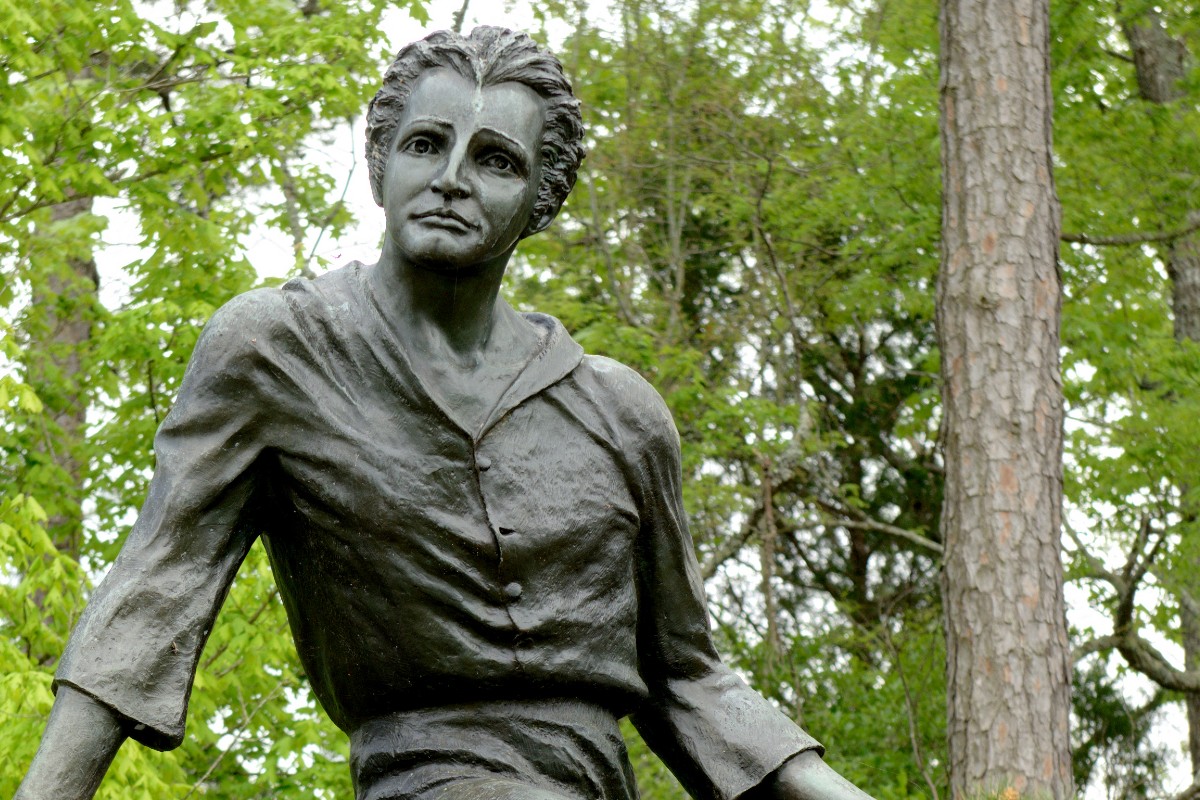
We’ll stick with statues again this week. What’s this one, where is it and why is it important? Bonus points: Who is the sculptor and why is the sculptor important? Send your guess – and your name and hometown – to feedback@statehousereport.com.
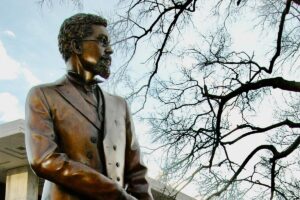 Last week’s image of “Looking ahead,” garnered identifications from a lot of longtime mystery sleuths who knew it to be a statue of Richard Greener outside the University of South Carolina main library. Greener was the school’s first African-American professor and first African American to graduate from Harvard University. He later served as dean of Howard University Law School.
Last week’s image of “Looking ahead,” garnered identifications from a lot of longtime mystery sleuths who knew it to be a statue of Richard Greener outside the University of South Carolina main library. Greener was the school’s first African-American professor and first African American to graduate from Harvard University. He later served as dean of Howard University Law School.
Hats off to these readers who identified the statue: Charlie Davis of Aiken; Pam Little-McDaniel and Barry Wingard, both of Florence; Jean Prothro, Jay Altman, Hector Diaz, and Elizabeth Jones, all of Columbia; David Lupo of Mount Pleasant; Penny Forrester of Tallahassee, Fla.; Doug Friedman of Charleston; Daniel Prohaska and Frank Bouknight, both of Summerville; Allan Peel of San Antonio, Texas;George Graf of Palmyra, Va.; Pat Keadle of Wagener; and Bill Segars of Hartsville.
Prothro shared an interesting tidbit: “Of interest to me in a recent book group discussion of The Personal Librarian regards Bella deCosta Greene, the daughter of Richard Greener. According to the fictionalized account, Richard Greener became estranged from his wife and daughters upon their claims to be White. The girls’ mother felt that since they could pass as white people, the girls would have better lives.”
>> Send us a mystery picture. If you have a photo that you believe will stump readers, send it along (but make sure to tell us what it is because it may stump us too!) Send to: feedback@statehousereport.com and mark it as a photo submission. Thanks.
- ORDER NOW: Copies are in Lowcountry-area bookstores now, but if you can’t swing by, you can order a copy online today.
- Now available as an e-book!
ABOUT STATEHOUSE REPORT
Statehouse Report, founded in 2001 as a weekly legislative forecast that informs readers about what is going to happen in South Carolina politics and policy, is provided to you at no charge every Friday.
- Editor and publisher: Andy Brack, 843.670.3996
Donate today
We’re proud to offer Statehouse Report for free. For more than a dozen years, we’ve been the go-to place for insightful independent policy and political news and views in the Palmetto State. And we love it as much as you do.
But now, we can use your help. If you’ve been thinking of contributing to Statehouse Report over the years, now would be a great time to contribute as we deal with the crisis. In advance, thank you.
Buy the book
 Now you can get a copy of editor and publisher Andy Brack’s We Can Do Better, South Carolina! ($14.99) as a paperback or as a Kindle book ($7.99). . The book of essays offers incisive commentaries by editor and publisher Andy Brack on the American South, the common good, vexing problems for the Palmetto State and interesting South Carolina leaders.
Now you can get a copy of editor and publisher Andy Brack’s We Can Do Better, South Carolina! ($14.99) as a paperback or as a Kindle book ($7.99). . The book of essays offers incisive commentaries by editor and publisher Andy Brack on the American South, the common good, vexing problems for the Palmetto State and interesting South Carolina leaders.
More
- Mailing address: Send inquiries by mail to: P.O. Box 21942, Charleston, SC 29413
- Subscriptions are free: Click to subscribe.
- We hope you’ll keep receiving the great news and information from Statehouse Report, but if you need to unsubscribe, go to the bottom of the weekly email issue and follow the instructions.
- Read our sister publication: Charleston City Paper (every Wednesday in print; Every day online)
- © 2022, Statehouse Report, a publication of City Paper Publishing, LLC. All rights reserved.















